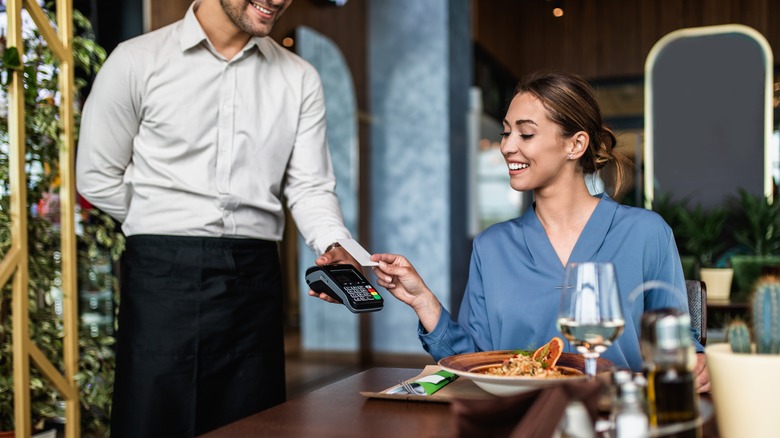The Hidden Fee That's Easy To Overlook On Restaurant Bills
Depending on the occasion, restaurant receipts can be rather long, considering they contain each item that each person purchased, along with a few other charges, such as taxes and gratuity. Instead of pulling out a phone and double-checking the math, many people just give the list a cursory glance to make sure nothing obvious leaps out before paying the bill. But closer scrutinization may reveal other charges. Some are unavoidable, while others, such as a convenience fee, might not be necessary.
A convenience fee has a generic name, but its purpose is very specific. Every merchant pays a fee for every sale they make using a credit card, usually between 1.5 and 3.5%. Instead of absorbing that fee into their operating costs, some restaurants add it directly to the customer's bill. The idea is that the customer is paying for the convenience of using a credit card — even if they end up having to pay additional interest if they can't pay off the balance in time.
Ways to avoid paying a convenience fee
A convenience fee is not a gratuity, nor is it a service charge. The former is added to the bill for good service and to augment server wages, while the latter is supposed to go to employees' health care coverage.
To avoid the additional convenience fee, you can pay with cash. If you do not feel comfortable carrying large amounts of cash, you can stop at an automatic teller to withdraw money before your meal. The problem here is that your bank may still charge you a fee for the withdrawal, although it is usually lower than the convenience fee. A less common option is to use a check. However, since many businesses are moving away from accepting personal checks or don't accept them at all, you must first be certain the establishment actually allows this method of payment.
A third option is to use a debit card. While many businesses charge an additional fee for the convenience of paying by credit, charging a fee for using a debit card is not permitted in any state. This law applies even if the customer wishes to process a debit transaction as a credit transaction.

